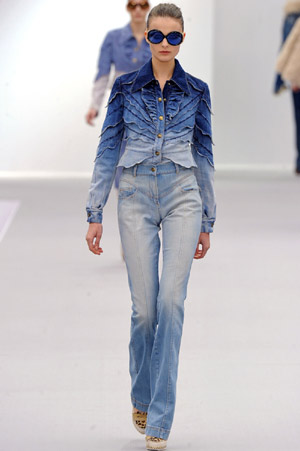国际著名女星莫妮卡•贝鲁奇曾经说过“性感的不是我,是意大利”。这句话足见意大利的风情。无数世界顶级的时尚品牌皆出于意大利,米兰时装周更被视为世界潮流的风向标。在意大利,时尚早已成为一种文化,而非名人、富人的专利,在这个浪漫、个性化的国家里,时尚已经融入到人们的生活中。

By Damyanti Ghosh
卓言 选 王雪娇 译
|
Looking good in Italy is a national obsession. Forget football, fast cars and food. This nation’s favourite pastime is style. Italians grow up in a culture of “bella figura”. This translates literally as “beautiful figure” but is more specifically understood as “a good image”. This is not only related to what you wear but involves how you “appear”: etiquette, reputation, style are all equally important. The way you present yourself to the world matters hugely. In a country where, even the police uniforms are designed by Valentino and footballers are kitted out by Mr. Armani, Italians consider it essential to look good pretty much from birth. This is not a new phenomenon and is in no way related to individual finances. Indeed, a little bit of style in Italy can take you a very long way. For Italians style is cultural democracy; in the words of Italy’s most famous journalist, Luigi Barzini, “where poverty can be worn with dignity... it is not noticeable or embarrassing”. In times of national and international disaster, Italians can be relied on to put their best fashion foot forward. When the first tourists arrived in Italy after WWII, they were stunned at the importance placed on fashion by the young men and women lounging in the bars and cafés of Rome. One observer commented, “Some of them would go without eating to devote the few pennies they had to buying suits, shirts and dresses which would enable them to cut a dignified figure at the passeggiata.” Italians seem to be quite happy to sacrifice comfort for style and elegance. And they insist on attention to detail. Never have I seen an Italian with a missing button on their suit, a hem falling down or sporting an unpressed outfit. I have also never seen an Italian woman in a pair of trainers. These impressive signorinas tackle the most gnarly of cobblestones in high heels with the grace of a gazelle and the determination of an Olympic athlete. Perhaps this is only to be expected. Italy is, of course, the shoe capital of the world. Style and function are inseparable in Italy and this is reflected in attitudes to dress. Italians favour well-tailored cuts in neutral colours like black, white, beige and navy. Natural fabrics reign supreme and showing too much flesh is considered déclassé. As Sophia Loren said, “A woman’s dress should be like a barbed-wire fence: serving its purpose without obstructing the view.” For a slice of la dolce vita, add a couple of dresses to your core wardrobe. You should treat yourself to a shirtdress, a shift dress and an archetypal little black dress. The first two will cover all bases whether at work or play. Both can be dressed up or down; try a beautifully-stamped Italian leather belt to cinch in the waist of your shirt dress or a little cashmere cardigan to drape over the shoulders of your shift. You can go anywhere: from drinks at Harry’s Bar in Rome, dinner at Cipriani in Venice to a delicious ice cream at Cova in Milan. A well-cut suit is a worthwhile investment. If you choose wisely, you will be able to wear the jacket and trousers as separates, which makes a careful wardrobe choice go a long way. Any trouser style will do: cigarette pants for those long of leg, highwaisted for the fashionistas among you or tapered if you prefer a more classic silhouette. The key is in the cut. Make sure the suit fits you like a dream and if it doesn’t take it to a tailor—a true Italian will not suffer an ill-fitting outfit. Accessories are where you make your personal mark. A jewel-coloured scarf, an iridescent silk blouse, a neon pump, some understated yet fabulous jewellery; Italians prefer to personalise with details. Logos are out. The only thing worth advertising is yourself. Italian designers have been hailed the world over since the heady, stylised days of Elsa Schiaparelli. Referred to by Coco Chanel as “the Italian artist who makes clothes”, Schiaparelli loved to juxtapose colours, textures and silhouettes and is often acknowledged as the designer’s designer. More recently the houses of Prada, Gucci, Fendi, Missoni, Versace, Valentino, Armani and Cavalli have dominated the fashion headlines. Whether it is the subdued chic of Armani or the extravagant glamour of Cavalli, Italian designers retain their pole position at the top of the fashion world’s radar. |
追求光鲜体面的外表是意大利人痴迷的执念。忘掉足球、快车和美食吧,这个国家最热衷的消遣是时尚。意大利人生长在bella figura的文化中,这一词直译是指“迷人的身姿”,但更常被理解为“良好的形象”。这不仅仅与你穿什么有关,而是指你“看上去”怎么样:礼节、名声、时尚都同样重要。用何种方式向世人呈现自己极为关键。在意大利,就连警察制服都是由瓦伦蒂诺设计的,连足球运动员的行头都由阿玛尼先生亲自打造,意大利人自打出生开始就认为保持良好形象是最基本的。 这可不是什么新鲜事,也无关个人财富的多少。实际上,在意大利一点点时尚就可以发挥很大作用。对意大利人来说时尚就是文化民主,用意大利最著名的新闻记者路易吉•巴津的话来说,“穷人也可以穿的很体面……这并不会惹人侧目或令人尴尬”。即使在国家或国际上遭受灾难的时期,意大利人也绝不会停止追求完美时尚的脚步。第二次世界大战后,当第一批游客来到意大利时,他们不禁惊讶于那些在罗马酒吧和咖啡馆里消磨时间的青年男女竟如此重视时尚。一个游客评论说,“有的人甚至不吃饭也要拿剩下的那点儿钱去买套装、衬衫和礼服,以便在散步时表现出体面的形象。” 意大利人似乎非常愿意为时髦与优雅而舍弃舒适,而且他们坚持对细节的关注。我从未见过一个意大利人的衣服缺纽扣、缝边脱线,或是穿着没熨过的服装招摇过市。我也从未见过意大利女人穿休闲运动鞋。这些迷人的小姐们用瞪羚似的优雅和奥运选手一般的意志穿着高跟鞋征服脚下最为“艰险”的鹅卵石路。或许这恰恰是我们所期待的。意大利,当然,是世界鞋履之都。 在意大利,时尚与功能是分不开的,这一点也体现在对待穿着的态度上。意大利人喜欢剪裁讲究、颜色中性化的衣服,比如黑色、白色、米色和海军蓝。天然针织品占绝对优势,穿着太过暴露会让人觉得品位降低。正如索菲亚•罗兰说的,“一个女人的衣服应该像一张带刺的铁丝栅栏:既发挥了应有的作用,又不会遮挡住里面的风景”。为了你的甜蜜生活,在主衣橱里添置几件衣服吧:你应该为自己准备一件衬衫式连衣裙、一件直筒连衣裙和一件基本款的小黑裙。前两者适用于任何场合,无论是工作还是娱乐。这两件裙子既可外穿也可内搭:在衬衫式连衣裙的腰际束一条带有精美印花的意大利皮带,或者在直筒连衣裙的外面披上一件短款对襟羊绒衫。基本款的小黑裙更是百搭:无论是去罗马的Harry酒吧喝酒、在威尼斯的Cipriani餐厅用餐,还是在米兰的Cova餐厅享受美味的冰淇淋。 一套款式精致的服装绝对值得投资。如果选择够明智,你还可以配穿不成套的夹克和裤子,这样,即使简单的衣橱也可以发挥很大作用。任何裤装款式都可以:烟管裤适合腿长的人;高腰裤适合时尚达人;如果你喜欢传统样式则可以选择锥形裤。关键在于款式。要确定这套服装完全适合你,如果不合身,就拿到裁缝那儿去修改,一个真正的意大利人是绝不会将就一套不合身的衣服的。 配饰则可以体现你的个人风格。一条宝石颜色的围巾、一件彩虹色的丝绸罩衫、一双亮色浅口鞋、几样低调却奢华的珠宝,意大利人喜欢在细节处体现个人风格。 名牌标识已经过时了。唯一值得宣传的就是你自己。自从艾尔萨•夏帕瑞丽开创的任性、极具风格的时代起,意大利设计师就一直在引领着世界潮流。被可可•香奈儿称作“做衣服的意大利艺术家”的夏帕瑞丽喜欢混搭不同颜色、材质和款式,被公认为设计师中的设计师。近几年,Prada(普拉达)、Gucci(古驰)、Fendi(芬迪)、 Missoni(米索尼)、Versace(范思哲)、 Valentino(瓦伦蒂诺)、 Armani(阿玛尼)和Cavalli(卡沃利)等品牌已经占据了新闻媒体时尚版面。无论是阿玛尼的柔和别致,还是卡沃利的奢华魅惑,意大利设计师在顶级时尚圈内始终占据着核心位置。 (来源:英语学习杂志) |
|
Vocabulary: kit out 配备,装备 lounge (懒洋洋地)倚,吊儿郎当地消磨时间 passeggiata (尤指晚上的)闲逛,散步 cut 此处指雕琢,塑造 sport vt. 惹人注目地穿戴 trainer 〈英〉休闲运动鞋 signorina 小姐(对未婚女子的尊称,相当于Miss) gnarly 〈主美口〉艰险且富于挑战的 gazelle 瞪羚(产于非洲和亚洲的一种小羚羊) reign 盛行,主宰,占支配地位 supreme 至高无上 déclassé 失去原有社会地位(的人),落魄(的人) Sophia Loren 索菲亚•罗兰(1934— ),意大利女影星,二战后最成功的国际影人,1992年获得奥斯卡终身成就奖,被誉为世界上最具自然美的人,意大利永远的女神 la dolce vita 意大利语,意味“甜蜜的生活”,常被认为是最适合形容意大利人生活的词汇 cinch 将……缚紧 drape over 使松散垂下,使随便地悬挂 Harry's Bar Harry酒吧位于罗马,创立于1911年,其装修古色古香的,钢琴演奏曼妙动听,以古典优雅的欧洲风情为主题 Cipriani 创立于1958年,是位于意大利威尼斯的著名奢华酒店 Cova Cova餐厅来自意大利米兰,成立于1817年,文艺气息浓厚,许多国际知名人士经常光顾,其主要顾客层为上流社会和中产阶级 like a dream 〈口〉轻而易举地,完美地 iridescent (变幻斑斓的)彩虹色的 tapered 锥形的 Elsa Schiaparelli 艾尔萨•夏帕瑞丽(1890-1973),意大利著名时装设计师。不同于同时代的著名设计师香奈尔,夏帕瑞丽认为时尚意味着新奇,所以主张新奇刺激的设计,“衣不惊人誓不休”。 她的设计奇而不失高雅,怪又不落俗套 |